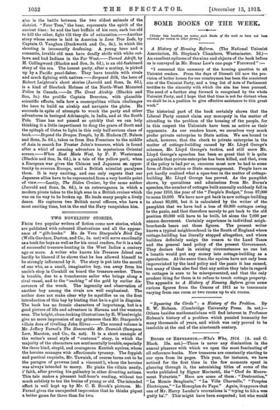SOME BOOKS OF THE WEEK.
[Under this heading we notice such Books of the week as have not bee% reserved for review in other forms.] A History of Housing Reform. (The National Unionist Association, St. Stephen's Chambers, Westminster. 3d.)— An excellent epitome of the aims and objects of the book before us is conveyed in Mr. Bonar Law's one-page " Foreword" :- "I commend this summary of the housing question to all Unionist readers. From the days of Disraeli till now the pro- vision of better homes for our countrymen has been the consistent aim of the Unionist Party, and a long list of Acts of Parliament testifies to the sincerity with which the aim has been pursued. The need of a further step forward is recognized by the whole Unionist Party, and I hope that that time is not far distant when we shall be in a position to give effective assistance to this great work."
The historical part of the book certainly shows that the Liberal Party cannot claim any monopoly in the matter of attending to the problem of the housing of the people, for in this respect the Unionists have been as active as their opponents. As our readers know, we ourselves very much prefer private enterprise to State action. We are bound to admit, however, that the check to private enterprise in the matter of cottage-building caused by Mr. Lloyd George's schemes, Mr. Lloyd George's tactics, and still more Mr. Lloyd George's speeches has been so great that it is quite arguable that private enterprise has been killed, and that, even if the policy is bad per se, recourse must now be had to some form of State action or State encouragement. People have as yet hardly realized what a spas-tree in the matter of cottage- building Mr. Lloyd George has proved. As the pamphlet shows, by quotations and admissions from Mr. Burns's speeches, the number of cottages built annually suddenly fell in the year 1910, the year of the " People's Budget," from 87,000 to some 10,000. We have now got back in new cottage-building to about 80,000, but it is calculated by the writer of the pamphlet that we have had a loss of 60,000 cottages owing to the panic, and that therefore merely to get back to the old position 60,000 will have to be built, let alone the 7,000 per annum decrement. Certainly experience in individual neigh- bourhoods bears out these figures. The present writer knows a typical neighbourhood in the South of England where cottage-building has literally stopped altogether, and where builders definitely assign the reason to the Land Taxes and the general land policy of the present Government. They declare that in existing circumstances no one but a lunatic would put any money into cottage-building as a speculation. At the same time, the squires have not only been impoverished by the land policy and the panic it has caused, but many of them also feel that any action they take in regard to cottages is sure to be misrepresented, and that the only prudent thing for them is to refuse to touch cottage property. The appendix to A History of Housing Reform. gives some curious figures from the Census of 1911 as to tenements varying from one room or two rooms up to six rooms.


























































 Previous page
Previous page